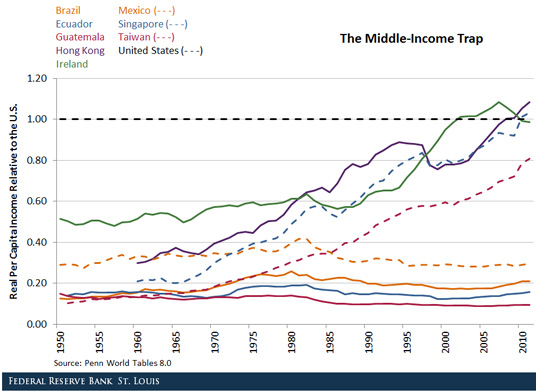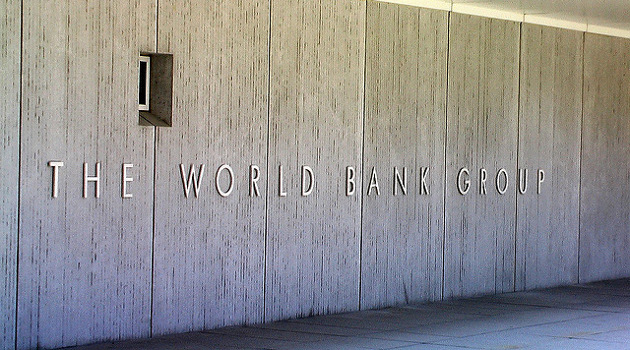I periodically explain that pro-market policies are the best way of helping poor people.
 The reason rich countries are rich is because they had lengthy periods of limited government, free markets, and the rule of law.
The reason rich countries are rich is because they had lengthy periods of limited government, free markets, and the rule of law.
And the convergence literature shows that the same thing is true for developing nations.
Today, let’s look at some new research from the World Bank on how good policy plays a role in generating wealth from natural resources. The authors start by explaining the issue they want to investigate.
The literature on economic development often assumes that natural resource endowments are exogenous. …the resource economics literature has emphasized that the resource base is endogenous to investment in exploration
and extraction. That literature has, however, overlooked the role that market orientation and institutions play in driving investments in the resource sector. Our aim is to bridge the gap between these two literatures and explore the effect of market orientation on the discovery of proven (known) natural resource wealth.
They cite the United States as an example of a country that benefited from the right policies.
The experience of the United States during the nineteenth and early twentieth century provides a historical account of the role of market orientation in driving natural wealth. Although the United States at the time of independence was considered to be a country of “abundance of land but virtually no mining potential” (O’Toole, 1977), by 1913 it was the world’s dominant producer of virtually every major industrial mineral (David and Wright, 1997). Rather than being driven by a comparative advantage in geological endowments, this resource-based development of the United States was driven among other things by an open market orientation and an accommodating legal environment with the government claiming no ultimate title to mineral rents
And they note that there is additional anecdotal evidence that liberalization produces good results.
Anecdotal evidence suggests that increased market orientation was followed by increased discoveries across continents and types of natural resources (see Table 1). The increase in discoveries after countries open up to the global economy appears to be quite stark. In Peru, for example, discoveries more than quadrupled, in Chile they tripled, and in Mexico they doubled. In Ghana, discoveries only started to occur after the opening of the economy.
Here’s a table showing the dramatic increase in discoveries after selected nations shift to a pro-market approach.
The authors want to see if such results are either random or policy-driven.
So they put together a detailed model and gathered lots of data.
…we put forward a simple two-region model of endogenous reserves based on Pindyck (1978) where multinational corporations are faced with an implicit tax which proxies for how closed market orientation is, and seek the lowest cost location. The model explores the interplay between market orientation and other channels such as the increase in the marginal cost of discoveries and (demand driven) natural resource price shocks. …For our empirical analysis we build a unique and hitherto unexploited dataset of the universe of world-wide major natural resource discoveries since 1950, covering 128 countries, 33 types of natural resources and over 60 years.
Here’s an example of the data they utilized.
And here are the results.
I’m not surprised to learn that good policy (i.e., free markets) generate a substantial increase in economic activity.
…our empirical analysis shows that market orientation causes a statistically and economically significant increase in natural resource discoveries. Our point estimates indicate that going from a closed to an open market orientation increases discoveries by 80-140 percent. …In a thought experiment whereby economies in Latin America and sub-Saharan Africa remained closed, they would have only achieved one quarter of the actual increase in discoveries they have experienced since the early 1990s.
The benefits are especially significant in developing nations, where market reforms appear to have produced a four-fold increase in the discovery of natural resources.
Here’s a look at the data for the entire study.
As you can see, there’s always an element of randomness and uncertainty in econometric research (“noise”), but the trend is readily apparent and the statistical tests provide a good amount of confidence about the strength of the relationship between more economic freedom and more economic activity.
I have two takeaways from this research.
First, we have the obvious result that property rights, rule of law, and other market-based policies are needed to help the poor.
Second, this is additional confirmation of my gut feeling that the World Bank is the best (least worst?) of the international bureaucracies. Yes, they waste money and are capable of producing bad research, but the organization’s culture seems to be focused on what changes are needed to help poor countries. And that often results in solid research (for other examples, see here, here, here, here, and here).
You can occasionally find good analysis from other international bureaucracies, such as the OECD and IMF, but it’s far more likely that those organizations will promote statist analysis because of a pro-government mindset.




